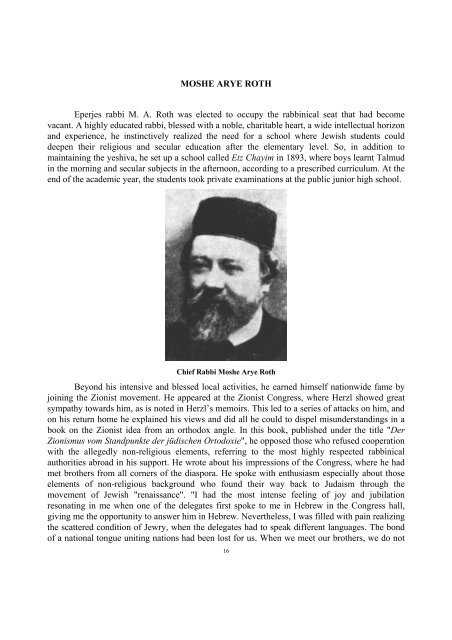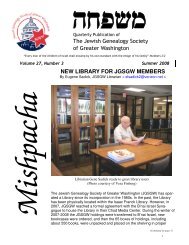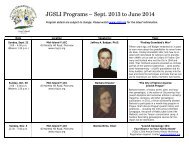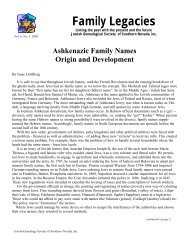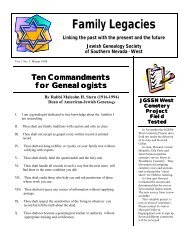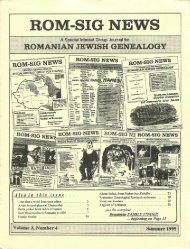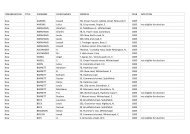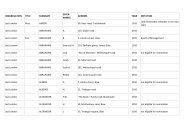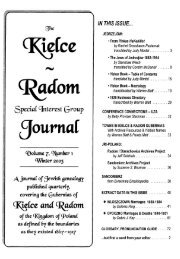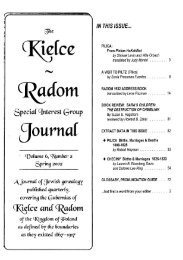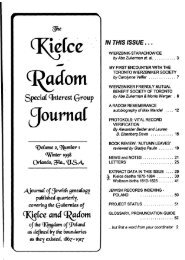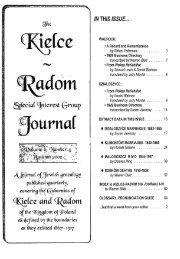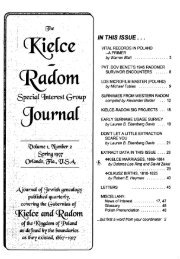THE MEMORIAL BOOK OF PÁPA JEWRY - JewishGen
THE MEMORIAL BOOK OF PÁPA JEWRY - JewishGen
THE MEMORIAL BOOK OF PÁPA JEWRY - JewishGen
You also want an ePaper? Increase the reach of your titles
YUMPU automatically turns print PDFs into web optimized ePapers that Google loves.
MOSHE ARYE ROTH<br />
Eperjes rabbi M. A. Roth was elected to occupy the rabbinical seat that had become<br />
vacant. A highly educated rabbi, blessed with a noble, charitable heart, a wide intellectual horizon<br />
and experience, he instinctively realized the need for a school where Jewish students could<br />
deepen their religious and secular education after the elementary level. So, in addition to<br />
maintaining the yeshiva, he set up a school called Etz Chayim in 1893, where boys learnt Talmud<br />
in the morning and secular subjects in the afternoon, according to a prescribed curriculum. At the<br />
end of the academic year, the students took private examinations at the public junior high school.<br />
Chief Rabbi Moshe Arye Roth<br />
Beyond his intensive and blessed local activities, he earned himself nationwide fame by<br />
joining the Zionist movement. He appeared at the Zionist Congress, where Herzl showed great<br />
sympathy towards him, as is noted in Herzl’s memoirs. This led to a series of attacks on him, and<br />
on his return home he explained his views and did all he could to dispel misunderstandings in a<br />
book on the Zionist idea from an orthodox angle. In this book, published under the title "Der<br />
Zionismus vom Standpunkte der jüdischen Ortodoxie", he opposed those who refused cooperation<br />
with the allegedly non-religious elements, referring to the most highly respected rabbinical<br />
authorities abroad in his support. He wrote about his impressions of the Congress, where he had<br />
met brothers from all corners of the diaspora. He spoke with enthusiasm especially about those<br />
elements of non-religious background who found their way back to Judaism through the<br />
movement of Jewish "renaissance". "I had the most intense feeling of joy and jubilation<br />
resonating in me when one of the delegates first spoke to me in Hebrew in the Congress hall,<br />
giving me the opportunity to answer him in Hebrew. Nevertheless, I was filled with pain realizing<br />
the scattered condition of Jewry, when the delegates had to speak different languages. The bond<br />
of a national tongue uniting nations had been lost for us. When we meet our brothers, we do not<br />
16


